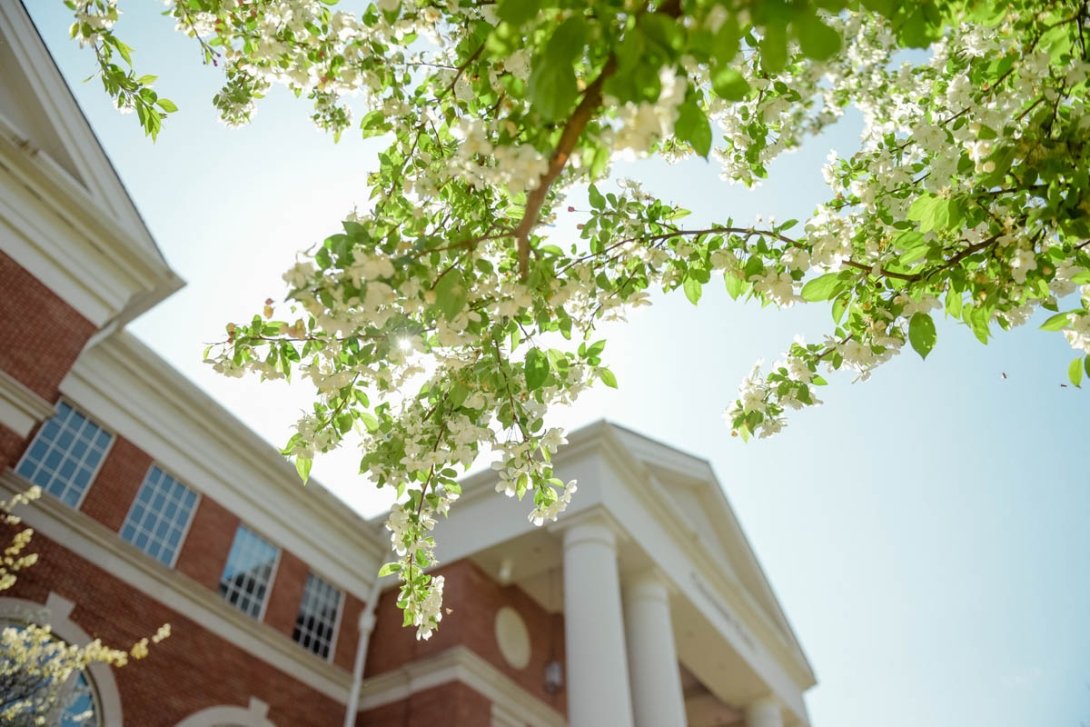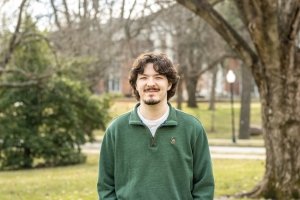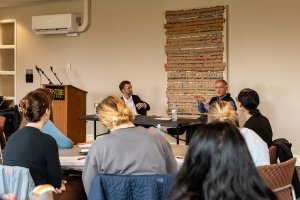Centre to offer second LINC course in fall 2020

As part of Centre College’s new CentreBlocks schedule for the fall 2020 semester, students will have the opportunity to study the often mind-bending theories about space and time in a Learn, Inquire and Network at Centre (LINC) course, an initiative within the College’s quality enhancement plan, Creative Centre.
During the paired courses in philosophy and physics, designed to be taken together, students will study the nature of space and time from the distinct perspectives of the two disciplines.
“We all navigate space and time every day, but few of us ever engage with the deep puzzles that arise from modern theories about space and time,” said Jim Kelly, associate professor of physics. “The goal of these paired courses is to take a deep dive into the modern ideas about space and time that arise out of physics and philosophy. They are specially designed to be accessible to the entire campus, regardless of major or year.”
The courses, taught by Eva Cadavid, associate professor of philosophy, and Kelly are part of Centre’s LINC initiative, which promotes creative thought by investigating a topic through the lenses of two distinct academic fields.
“It’s a very unique way to learn about the subject, where each professor is a student in the other’s course and all students enroll in both,” Kelly added. “The LINC course experience ends up being very cohesive—we all get to know each other very well, and many ideas are visited in both courses, but in different ways.”
Cadavid and Kelly think the courses, first taught together in 2018, will provide an even more cohesive experience in the special fall CentreBlocks schedule, as students can jump into the subject without having to manage other courses at the same time.
Kelly’s course, “Space, Time, and the Theory of Relativity,” gives a detailed look at Einstein’s special theory of relativity.
“Relativity tells us that many of our intuitions about space and time are just wrong,” Kelly said. “It’s very entertaining, even mind expanding, to understand the bizarre predictions of relativity which agree so well with experiment but are so much at odds with our everyday experience. It really changes how you view your place in the world and your notion of self.”
Although relativity theory sounds like it might be inherently very mathematical, Kelly says that the mathematics used doesn’t go beyond high school algebra.
“We really chose the subject because it had a great interplay between philosophy and physics, while not requiring any advanced mathematics for a deep understanding,” he shared. “The reputation for difficulty in special relativity lies not in mathematics, but in how it disagrees with our everyday intuitions and assumptions.”
In 2018, the majority of the students enrolled in the LINC course came from outside of philosophy and physics majors.
“We had a few physics and philosophy students, but we also had several from English and behavioral neuroscience, among other majors,” Kelly added. “We also had a sizable group of undeclared first-year students. The course is designed to be accessible to all Centre students and includes readings from a book intended for nonscientists.”
Cadavid’s paired course, “Philosophy of Space and Time,” considers historical and contemporary views on the nature of space and time. It also explores questions that have made it from philosophy to the popular realm such as whether time travel is possible, what are the implications of time travel, and whether time exists independent of us and, if so, is it linear or circular.
According to Cadavid, the opportunity to study these topics from an interdisciplinary perspective can be challenging but also very rewarding.
“When we taught it in 2018, we found that students who were not already majoring in physics and philosophy usually had an easier time switching between the scientific and philosophical perspectives and contributed greatly to our learning community,” she said.
Physics major RileyAnne Sharpe ’20 (Huntsville, Alabama) took the class two years ago, because she thought it was an interesting concept to combine physics and philosophy courses.
“I think this class and other LINC courses are important, because it stretches people to think in a different way about subjects they might be very familiar with,” Sharpe said. “It was interesting also to see how people who think very differently than me are able to learn, and this class was a good way to understand the difficulties inherent in majors different from my own.
“For example, I usually understood the physics concepts pretty quickly—not because they were easy but because I had learned a lot of them before—but the philosophy did not come as easily to me,” she continued. “It was very difficult to shift my way of thinking to the—usually—precise science of physics to a more abstract way of thinking. We got to talk about some of the very basic philosophical assumptions about space and time that just about everyone, except for philosophers, take for granted, and I never would have even thought to ask some of the questions that we attempted to answer.”
When Aditi Shukla ’21 (New Delhi, India) took this course, her major was undecided and she intended on majoring in politics. Two years later, she is now a philosophy major.
Shukla believes this is an important class for students to take because of how unconventional it is.
“Taking this class means fully taking advantage of the liberal arts education, no matter what your major is,” she said. “Secondly, the concept for this class was so sophisticated and high-level. I mean, we all struggled a little bit, but that was the fun of it. We read some incredibly intelligent and prolific people, and the amount of exposure it gave us in both physics and philosophy was invaluable.”



